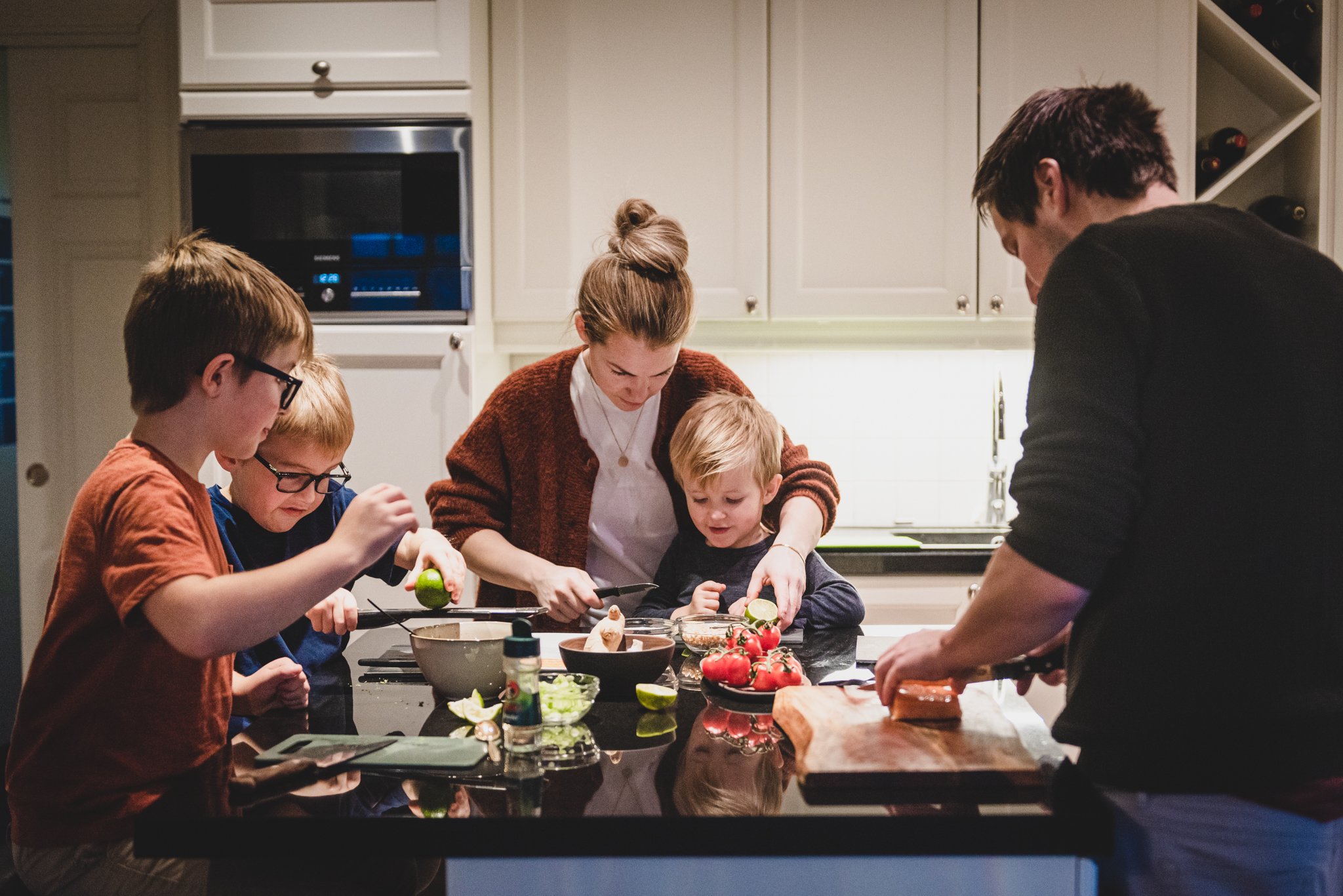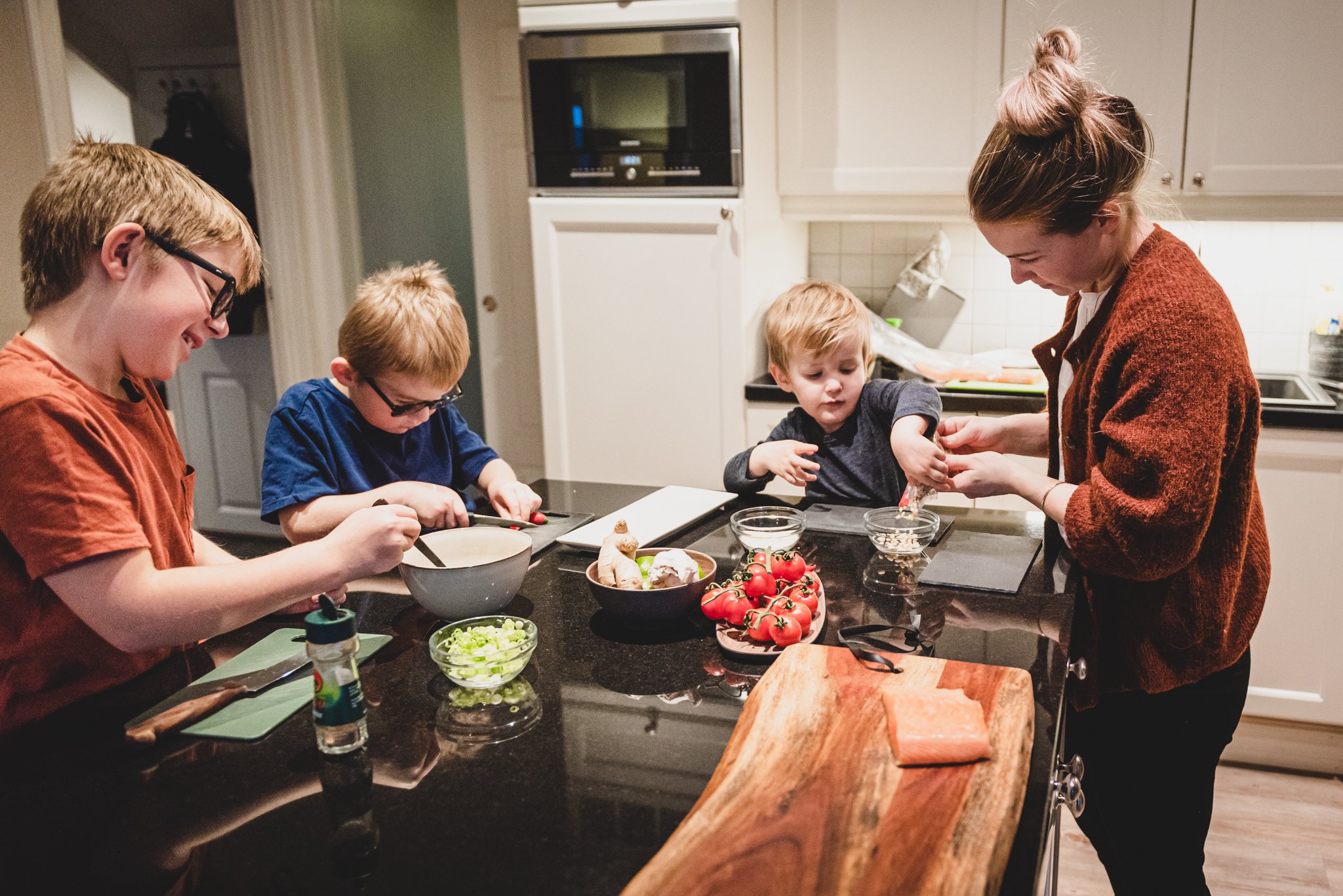8 Benefits of Bringing Your Kids into the Kitchen
What’s that magical place in your home where kids can study language, math, science, physics, chemistry, art, and also learn about their health?
It’s the kitchen! Bravo to those who guessed correctly! The kitchen is such a special space for learning, experimenting, and bonding.
By welcoming kids into the kitchen, inviting them to experiment with cooking, and sparking their culinary curiosity from a young age, you can cultivate a habit in them that will have lifelong benefits.
Whether it's simply putting lemon and garlic atop salmon before it goes in the oven, adding toppings to a pizza, snapping the ends off beans, or scrapping jars, any regular effort in the kitchen has a valuable result in the long term.
And when we say "start them, young," we mean it! Give babies and toddlers wooden spoons and measuring cups to play with, as well as different appropriate homemade foods to snack on.
Ultimately, the joy of creating a meal, serving it, sharing it, and eating it builds confidence and independence. And your kids will also have fun, warm, and lasting family memories that will be treasured forever.
But beyond this, there are other fantastic reasons for bringing kids into the kitchen:
You raise adventurous eaters
By learning to cook at a young age, kids are much better prepared for it in adulthood. They're also likely to be adventurous eaters. One of the greatest benefits of cooking with children is that it can help them develop an adventurous and varied palate. Psychological studies show that kids who have been active in the kitchen and involved in cooking are generally keener to experiment and try new foods.
Your kids build healthy habits
In addition to being open to tasting different foods, another big advantage of cooking is the healthy aspect of it: homemade meals are probably the best choices we can make for our bodies. Looking at research again, it says that people who eat home-cooked meals on a regular basis tend to be happier and healthier and consume less sugar and processed foods.
Cooking helps kids' physical development
Measuring, scooping, peeling, stirring, mixing, washing, drying, whisking, rolling, squeezing, and spreading—these are just a few of the kitchen tasks that stimulate young children to develop fine motor skills and hand-eye coordination. (Interestingly enough, those skills are also built while coloring.)
Kids learn responsibility, planning, and organization
Grocery shopping, organizing the pantry, keeping an eye on expiration dates, learning how to store food, keeping the fridge clean, cleaning the kitchen, washing the dishes, putting stuff away — all those little tasks are crucial parts of the cooking process as well, and they teach kids about responsibilities, daily chores, planning, and how to be organized.
It helps your kids cultivate patience.
Unless it’s a salad or a sandwich, most things we prepare in the kitchen require some time to be ready. Patience and learning how to wait is a quality any adult ought to have, and should be introduced to children as early as possible.
Cooking teaches language, math, creativity, and science
The sensory aspect of cooking makes the process really engaging in a way that feels also fun—like a game. Kids expand their perspective about the world by touching, tasting, feeling, smelling, observing, reading, listening, and following steps. We know it may sound unusual, but our kitchens are one of the most engaging and intriguing environments for learning at home.
Following recipes, observing the transformation of food, describing what we are seeing, smelling, tasting, and doing helps a lot with language development and exposes children to plenty of new and useful words. Older kids can experiment with creating their own recipes, which is a great way to introduce them to analytical and instructional writing.
Cooking offers a great opportunity to help with language around quantity and comparison (bigger, smaller, more than), number recognition (reading numbers on cups, scales, food labels), counting (4 tablespoons of…), adding, multiplication (when doubling a recipe), measurements, and fractions. These are just a few examples of all the practical math skills being absorbed in the kitchen!
By using our imagination and with the help of some engaging storytelling, the kitchen at home can be reimagined as a mini science lab! There, children can witness firsthand how materials change consistency, color, texture, and shape. There we can also encourage them to exercise their skills to make predictions and observations.
The beauty of all that learning happening while cooking is that there is also a big opportunity for being creative, expressing different ideas, and experimenting with recipe adaptations and the way food is presented—not to mention, taking pictures of the final results!
Kitchen time promotes bonding
The kitchen is a very active place where connections can be built through quality time together—without TV and screens. It’s a great opportunity to share about family traditions, recipes, stories from your childhood, culture, or simply a nice time to catch up with each other during a busy day. In addition, it is a good moment for siblings to cooperate and communicate, which in time, will result in stronger relationships.
Kids learn self-expression and build confidence
Making children feel included in mealtime is a meaningful way to stir up their self-expression, thinking, suggestion processes, and proactivity. Collaborating with them when selecting recipes, grocery shopping, picking up ingredients, creating holiday menus, setting up the table helps them feel invested, “in charge”, and responsible for the positive outcome of their own actions.
Learning to cook is also a chance to nurture self-esteem, confidence, and a sense of self-worth. Children usually experience an amazing sense of pride when they feel they’ve successfully prepared a meal for themselves or their family. Support them, set them up for success, and celebrate their achievements!





